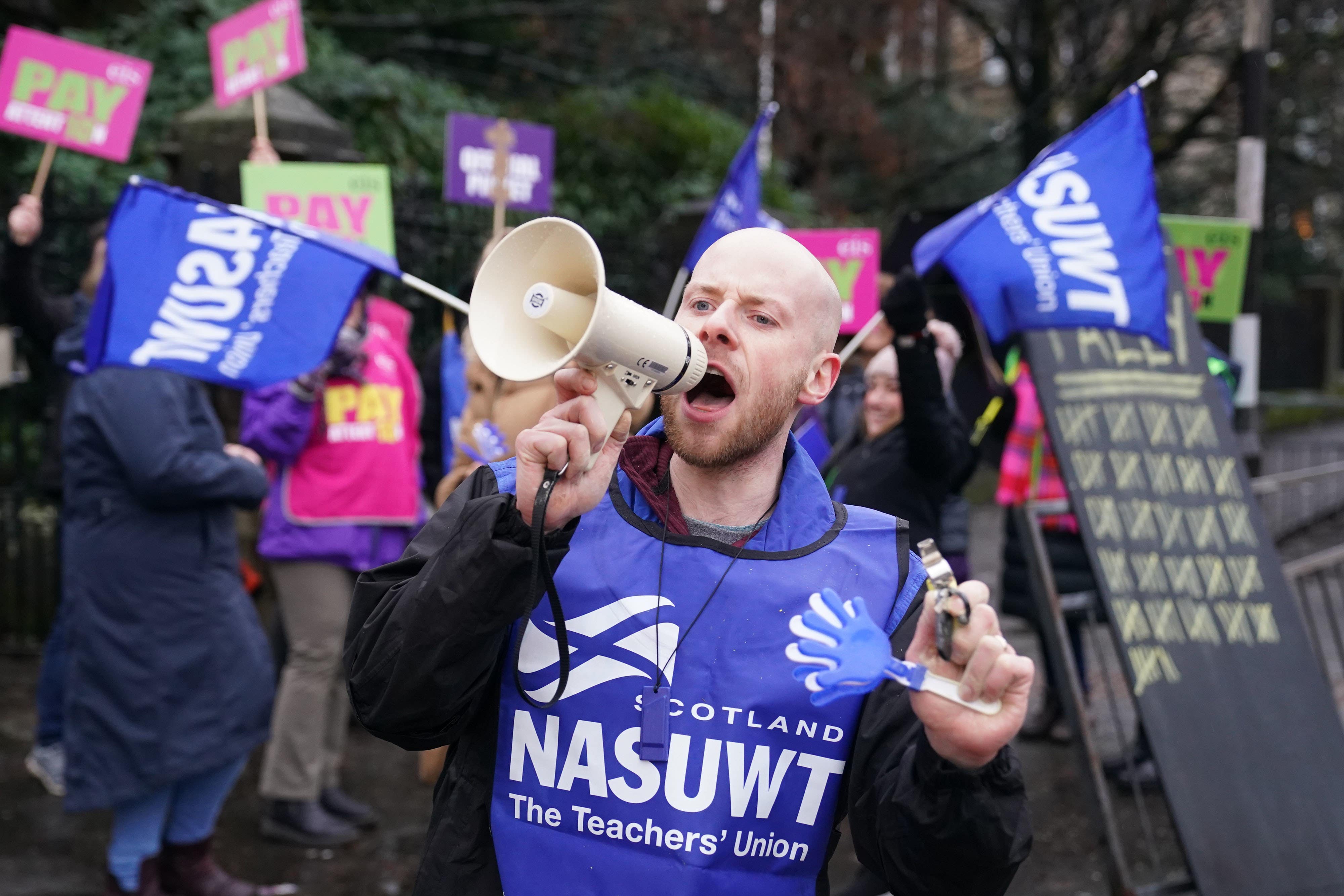Prelim exams affected as teachers take second day of strike action in pay row
Secondary schools around Scotland are shut on Wednesday.

Your support helps us to tell the story
From reproductive rights to climate change to Big Tech, The Independent is on the ground when the story is developing. Whether it's investigating the financials of Elon Musk's pro-Trump PAC or producing our latest documentary, 'The A Word', which shines a light on the American women fighting for reproductive rights, we know how important it is to parse out the facts from the messaging.
At such a critical moment in US history, we need reporters on the ground. Your donation allows us to keep sending journalists to speak to both sides of the story.
The Independent is trusted by Americans across the entire political spectrum. And unlike many other quality news outlets, we choose not to lock Americans out of our reporting and analysis with paywalls. We believe quality journalism should be available to everyone, paid for by those who can afford it.
Your support makes all the difference.Some secondary schools will have had to reschedule preliminary exams as teachers walk out in a second day of strike action, unions have said.
Secondary schools across Scotland are closed on Wednesday as teachers take industrial action in a pay dispute, after teachers at primary schools walked out on Tuesday.
It comes after last-ditch talks between the Scottish Negotiating Committee for Teachers (SNCT) and the Scottish Government failed to find a solution.
Unions have demanded a 10% pay increase but the Scottish Government has offered 5%, including rises of up to 6.85% for the lowest-paid staff.
Mike Corbett, NASUWT Scotland national official, said the action on Wednesday will have had an impact on the exam diet for some schools.
He told the PA news agency: “It will depend on individual schools. A lot of schools have their prelims in January and there’s no doubt that there will be some schools around who will have had some preliminary exams scheduled for today, that they have had to shift.
“We’ve not heard of that posing any particular problems for these schools, they will presumably have just shifted them to a bit later on. We will be talking about small numbers of individual schools and pupils that that will affect.
“As we’ve said all along, I don’t think any of our members want to be out on strike today but despite some talks and pay negotiations there’s still no revised pay offer on the table, it’s the same offer as in November and they feel pushed into a corner.”
Scotland’s Education Secretary Shirley-Anne Somerville on Tuesday said she will leave “no stone unturned” to bring about a quick resolution to the teacher strikes.
Mr Corbett said: “We noted the Cabinet Secretary’s statement to the Scottish Parliament about leaving no stone unturned in seeking a resolution.
“We will take her at her word and hope to see a revised offer, and hope to see a resolution of the dispute.”
Primary schools around Scotland were shut on Tuesday as teaching union members walked out.
The January action comes after SSTA and NASUWT members took two days of action in December and EIS members walked out on November 24.
Striking teachers gathered outside Cosla’s headquarters in Edinburgh on Tuesday afternoon where the EIS general secretary accused the local authority umbrella group and the Scottish Government of “Tory tactics” in trying to weaken the strike action.
Andrea Bradley told members of the union she was confident of victory in the dispute, but said employers were “dampening aspirations”.
She said: “The employers’ body knows, if teachers are paid more fairly for the work that they do, that will raise the aspirations of other workers too.
“Cosla and the Scottish Government, they don’t want that. They want to tie one set of negotiation arrangements to another, doing all that they can to dampen aspirations.
“Overall we have lost 20-25% of the value of our pay since 2008. That’s unfair and that’s unacceptable.”
First Minister Nicola Sturgeon also spoke to journalists about the strike on Tuesday.
The First Minister said: “I deeply regret that we have industrial action in our schools.
“I don’t think that’s in the interest of young people at all.
“That said, I understand the strength of feeling of teachers and we highly value the teaching profession.
“I can’t create additional funding that we don’t have and I’ve tried to be really honest with unions across the public sector.
“We’re trying to be as fair as possible while maximising pay increases.”